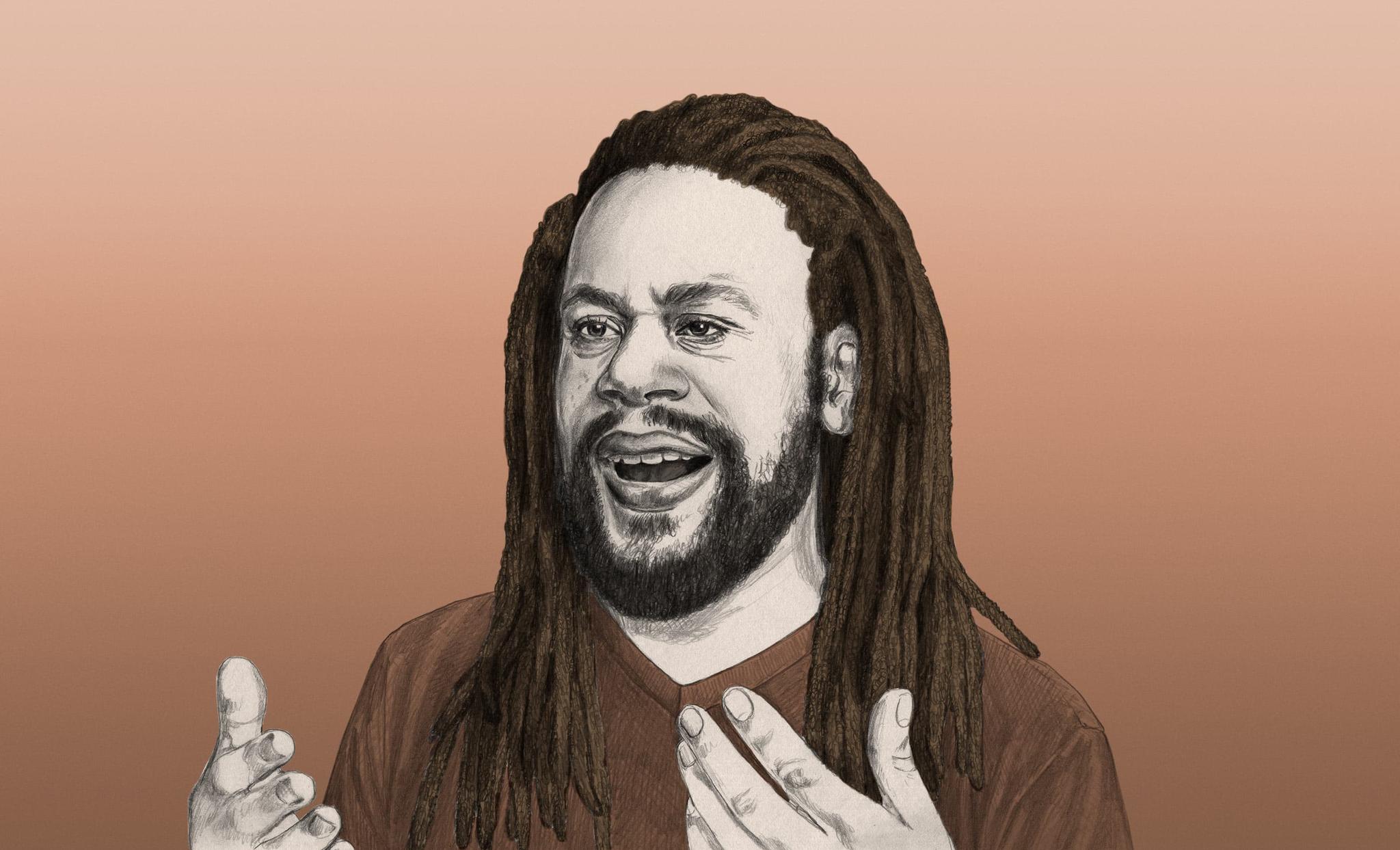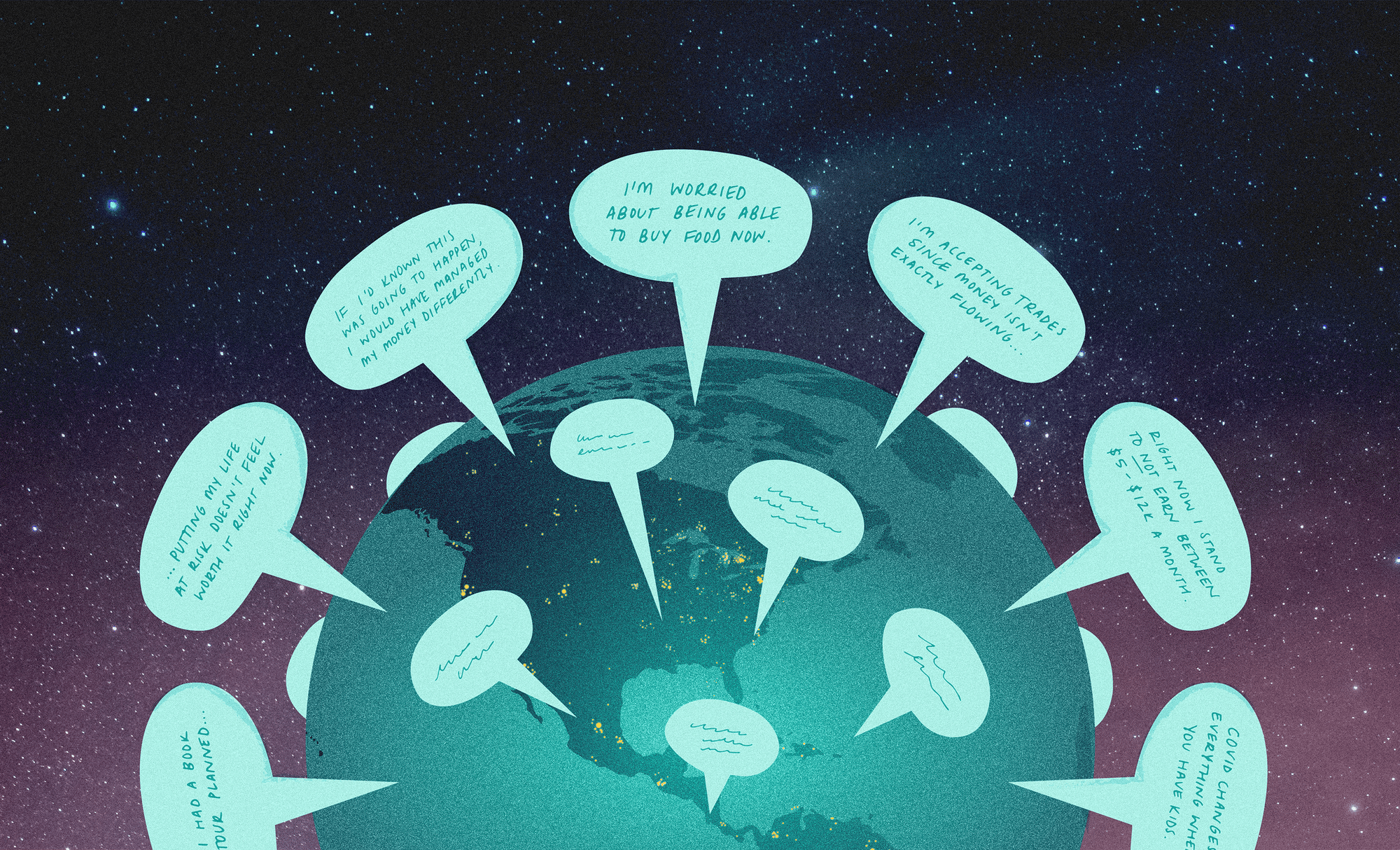
Money Diaries
How Hollywood's The Black List Changed the Economics of Movies
Franklin Leonard’s list of the best un-produced films in Hollywood used small data to convince Hollywood to make movies like “Argo” and “Slumdog Millionaire”
Wealthsimple makes powerful financial tools to help you grow and manage your money. Learn more
Wealthsimple is a whole new kind of investing service. This is the latest installment of our recurring series “Money Diaries,” where we ask interesting people to open up about the role money has played in their lives.
The screenwriting business isn’t like it was in the heyday of the 1990s. Back then, people like Shane Black (he wrote such movies as Die Hard) and Joe Eszterhas (movies like Basic Instinct and Showgirls) were selling scripts for $3 or $4 million. Today, there’s one class of screenwriters, including Aaron Sorkin and Shonda Rhimes, who do very, very well. The rest work in relative obscurity with a modest income.
If you’re outside of Hollywood, it’s easy to imagine that screenwriters working in Hollywood are getting rich, but that’s not really the case. If you’re one of the lucky ones, you can support a family in an expensive city like Los Angeles or New York. But you’re not making a million dollars a script. You’re making $100,000 for six months of work, and 60 percent of that goes to taxes and your agent, manager, and lawyer. Some of what you write you might not even sell. And it’s not like you’re getting a weekly paycheck. Most working screenwriters are just regular folks who feel passionately about movies and want to tell stories. But even theyknow that they are among the lucky ones because their scripts are actually being read.
Most people who want to become screenwriters start with something called a spec script. It’s a script that a writer creates even though no one is paying them to do it. The fairy tale version is: The writer sends the script to someone, sells it, and that’s it. They’re set. But the truth is it’s very hard for outsiders to get noticed. And I guess that’s part of the reason I started The Black List.
My first job was running the outfield scoreboard for the RedStixx, a Single-A affiliate of the Cleveland Indians, in my hometown of Columbus, Georgia. I was 14. I’d get a ride to the ballpark with my dad, who was in the Army, or my mom, a teacher. The scoreboard was electronic, operated by an Atari-type controller. I updated the runs, hits, and errors, and when a new batter came to the plate, I tossed a chyron underneath: 2 for 2 with a double and a single. The RedStixx paid me some nominal amount, plus three hotdogs per game. I loved the job. And quickly, I became obsessed with baseball statistics. As a teenager, I pored over the stats in Bill James’s Baseball Almanac day and night. This was before Moneyball and Theo Epstein—and at the time, baseball insiders viewed James’s stats-driven approach skeptically, like witchcraft. But the idea that you could impose order on the world through numbers has always appealed to me—and it would ultimately become the basis for my career.

Sign up for our weekly non-boring newsletter about money, markets, and more.
By providing your email, you are consenting to receive communications from Wealthsimple Media Inc. Visit our Privacy Policy for more info, or contact us at privacy@wealthsimple.com or 80 Spadina Ave., Toronto, ON.
My other love when I was growing up was film. By 2005, at age 27, I was working as a development executive at Leonardo DiCaprio’s company, Appian Way. My job was to find good scripts that I could pass up the chain of command, identifying writers who we should be working with or movies we could make. But I felt like I was doing a very bad job of uncovering great scripts. There were so many unproduced screenplays circulating in Hollywood, with such a vast range of quality, and there was no good way to identify the great ones without reading each and hoping for a jackpot. It could feel like looking for a needle in a haystack.
For most of my life, I aspired to be a badass, to be important in my industry. These days I worry about money a lot less.
On a whim, before taking off on a vacation, I created an anonymous Hotmail account and emailed 75 of my peers. I wrote, “Send me a list of your favorite unproduced screenplays. In exchange, I’ll send you back the combined list.” It was an analytics play in a way—harnessing the latent aggregation just sitting out there. Almost everyone responded, and once I received their recommendations, I crunched the numbers and compiled the screenplays that were mentioned most. I gave the list a quasi-subversive name, The Black List, which was both a tribute to the writers who were blacklisted by Hollywood in the McCarthy era and a playful inversion, to make the point that “black” doesn’t need to signify something bad. Using the same anonymous Hotmail account, I sent the list to everyone who contributed, simply saying that these were the year’s best unproduced screenplays. Then I left for vacation, without any more thought to it.
A couple of days later, I checked my email at the hotel business office, and I was shocked to see that the email I’d sent containing The Black List had been forwarded to me almost a hundred times from a wide range of people. They were saying things like, “Yo, where’d this list come from? It’s crazy!I’ve read a bunch of these scripts. They’re really good!”
In just two or three days, my hastily compiled analytics-based list had gone viral across Hollywood. The notion of going viral in those days barely existed. Facebook had just begun to creep from its cave; iPhones didn’t exist, and neither did Twitter. The Black List went viral in Hollywood the same weekend that the Saturday Night Live video “Lazy Sunday” went viral on the internet, which was a big moment for YouTube. I just couldn’t believe that everyone in the film industry was sharing and buzzing over a list I’d put together.
When I got back from vacation, my first thought was, I’m going to get fired. It wasn’t that I thought I’d done something bad, but I figured if aggregating everyone’s feelings about unproduced screenplays was a good idea, someone would have done it before, so there must be a reason that nobody had. Without a rational explanation for my fear, I didn’t tell a soul that I was behind The Black List.
Black List scripts have led to Oscars for such movies as "Spotlight", "Argo", "The Revenant", "Whiplash", "Slumdog Millionaire"
A few months later, I got a phone call from an agent who was pitching me a new client, the same type of call I got every day: “Hey, I have a new client who wrote this script. I think Leo’s going to love it! I already gave it to Brad Pitt’s company, so you should probably read it soon.” But this call ended differently. The guy was like, “Listen, don’t tell anyone, but I have it on really good authority that this one is going to be the number-one script on next year’s Black List.” My jaw dropped. Did he somehow know that I’d created The Black List, and was he testing me? I paced around my office and tried to play it cool. “Yeah. Really? That’s fascinating! Hey, do you know who made The Black List? What’s the story?” And he said, ”I can’t say anything, but just trust me.” I got off the phone and sat in my office in a daze.
I realized that I had created something that would help people find good scripts, since The Black List had already helped me find good scripts. The next year, I sent another anonymous email asking for suggestions and created a new Black List. I was like, I’m going to get fired! But I’m doing this. The thing is, I must have gotten sloppy about keeping it a secret. I talked to a few close friends about it; they talked to their friends, I guess. Soon, the Los Angeles Times unmasked me. But instead of getting fired, as I’d feared, I was promoted. And eventually I was offered a job as a development executive at Will Smith’s Overbrook Productions.
A year later, Juno and Lars and the Real Girl were nominated for Academy Awards for best original screenplay, which was significant because they had been numbers two and three on the original Black List. Quickly, things leapt to an even higher level. Brad Pitt was quoted in The Wall Street Journal saying, “The Black List is very important.” Scripts that were high on the list began to get heat, even if they’d been circulating for years. More and more were getting the green light and going into production. It was mind-blowing!
Now I reach out to about 600 film execs and producers every year, asking for their favorite unproduced screenplays, and maybe half of them respond. Once I tabulate the responses, I compile a new Black List, which includes about 70 to 90 scripts. And in recent years, Black List scripts have led to best picture or best screenplay Oscars for such movies as Spotlight, Argo, The Revenant, Whiplash, Slumdog Millionaire, The Wrestler, The Imitation Game, and The King’s Speech. I’m careful to never claim credit for the scripts being good or the movies being good, but I think The Black List has often served as a catalyst for a lot of the attention around these great scripts. You’re never going to hear me say, “This movie got made because it was on The Black List.” The script was already really good, obviously. But I’ve heard people say, “My movie got made because of The Black List,” and I’m happy to hear that.
In 2012, I left Will Smith’s company to work full time on The Black List as a for-profit venture. I gave up a bigger paycheck to do it. But I was able to achieve something different. The Black List had already been useful to help people within the industry—those who already had managers and agents—gain traction for their scripts, but I felt like I wanted talented people outside the industry to also have a chance for their work to be discovered. That’s the whole fairy tale—a talented writer sending out a spec script as an outsider. The idea was to create a Black List website where people could upload their own scripts.
It was absolutely terrifying, going from a job with a salary to running my own business. In the first year, I woke up every day at 6 a.m. without an alarm clock, terrified: Today’s the day it all falls apart! And to be perfectly honest, even with all of the success we’ve had in the past five years, that pit of self-doubt never goes away entirely. When I talk to other entrepreneurs, including people who are a lot more successful than I am, they always tell me, “It doesn’t go away. The lick of flames is always on your toes.”
People pay $25 to upload a script and $75 to have it evaluated. I didn’t want to be that sleazy guy promising something without delivering results. If the process can’t do what you’re claiming it does, then you’re a fucking snake-oil salesman. But when the first movie got made from a script discovered off The Black List website, I felt really good about it. That movie was written by a guy in suburban Chicago who had gone to NYU but, in 30 years of writing, had not had a movie made. He uploaded the script to the site, where it was discovered. David Oyelowo starred in the film, Nightingale, and it was nominated for a Golden Globe and two Emmys. Since then there have been a half dozen more movies made from scripts off The Black List site, all of which have debuted at major festivals. I got an email recently from a user of The Black List site saying, “Thank you so much! I quit my job today because I sold my script to Warner Brothers!” It doesn’t get much better than that.
But the thing is, even successful screenwriters are kind of taken advantage of. I’d like to see screenwriters whose films make a ton of money be better compensated on the back end for their work. Say you write a screenplay based on your own original idea and sell it for $250,000, if you’re lucky. Of that amount, 60 to 70 percent goes to taxes and your agent, lawyer, manager, and publicist if you have one. Maybe you’ll have $100,000 left, at best. And who knows when you’re going to sell the next one? Someone buys the script and makes it, and the movie pulls in $200 million. These cases are rare, but they do happen. Well, guess what? You’re not seeing any of the $200 million. I think that’s unfortunate. Without your script, the director has nothing to shoot; the actors have nothing to say. I don’t think the studios need to give the screenwriter a check for $100 million but give them a little taste of the back-end money.
Another way The Black List helps is that writers who do very indie scripts that end up on The Black List are then hired to write big giant movies. So while the script that landed you on The Black List may never get made, you might go on to write a huge Marvel movie. There are tons of examples: Nicole Perlman writing Guardians of the Galaxy, Jon Spaihts writing Dr. Strange, and Chris Terrio, who wrote these tiny, tiny movies that ended up on The Black List and then wrote Argo, which won best picture, and then wrote Batman vs. Superman.
People concentrate on how Hollywood is so risk averse now—making more sequels and more blockbusters meant to appeal to people the world over with explosions instead of words. But there are some promising trends too. People can go on Rotten Tomatoes, which aggregates the critical response to movies—in the way The Black List aggregates scripts—to see if the movies are good or if they stink. That forces the people who are making movies to be damn sure they’re good, because if they’re bad, they’re going to lose money. Quality matters more than ever before. Plus, movies are getting less expensive to make. The indie film Tangerine was shot on an iPhone 5—not even the latest model! It looks great, and a lot of people watched that movie. Moonlight is another example. The Oscar winner for best picture cost $1 to $2 million, which was not quite as tiny a film as Tangerine but that’s nothing compared with a studio film. Yet it’s beautiful, perfectly executed. And people went to see it, and pay for it. Do I worry that movies like Moonlight are going to disappear? No. Because there are always going to be artists out there like(writer and director) Barry Jenkins who are capable of pulling off something like that. My biggest hope is that the economic success of those films flows to the people who made them as much as possible, and that they’re then able to monetize them and continue to make more movies.
For me, my relationship with money has shifted too. For most of my life, I aspired to be a badass, to be important in my industry. I figured if I was important, I’d be a millionaire by age 30. But there were days I’d feel crappy and weird when I looked in the mirror, wondering if the work I was doing was helping the world or only helping certain people make money.
These days I worry about money a lot less. I make just enough to live in a one-bedroom L.A. apartment and keep food on the table for me, my girlfriend, and my dog. I’m not rich by any means, but I love my work. There were versions of my career in which I could have been getting paid a lot more. But I think I would have been miserable. The times when I’ve taken a pay cut to do a job that I liked more, a job where I’d have more autonomy and more control over my own life, I’ve always found myself to be happier. I stopped thinking about wanting to be rich or powerful, and instead, I just want my work to matter. If money follows, that’s great. But at the very least, I can look in the mirror and be proud.
As told toDavy Rothbart exclusively for Wealthsimple. Illustration by Jenny Mörtsell. We make smart investing simple and affordable.
Wealthsimple's education team is made up of writers and financial experts dedicated to making the world of finance easy to understand and not-at-all boring to read.









